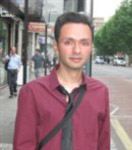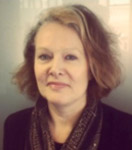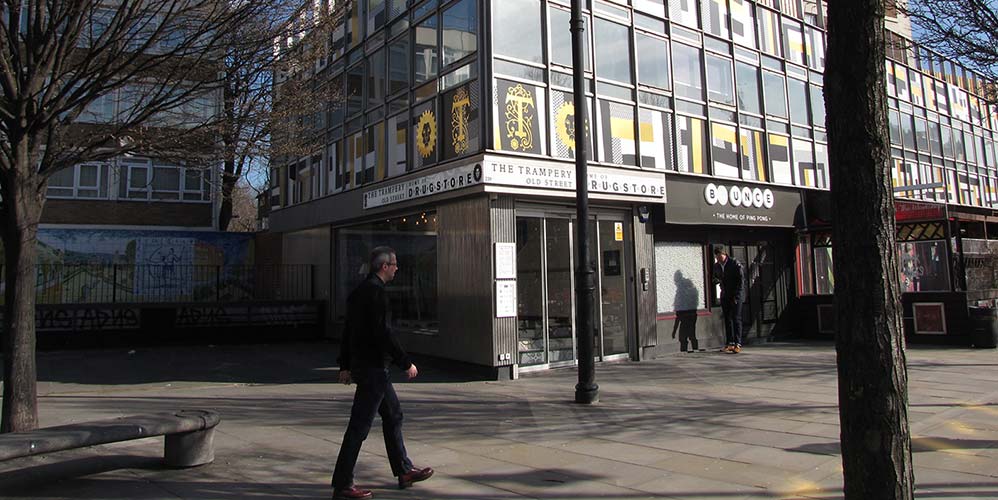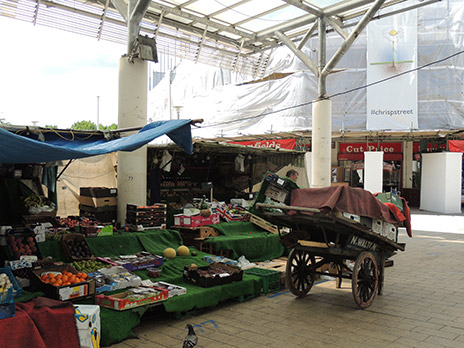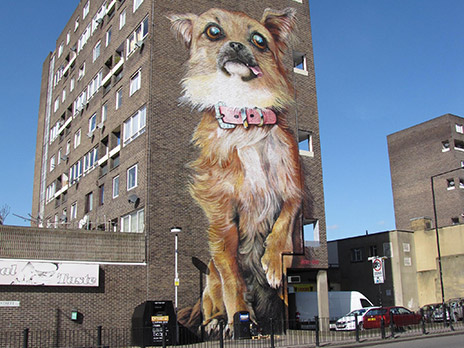Place Work KnowledgeThe Place Work Knowledge (PWK) research strand focused on the processes that drive and sustain London’s creative and cultural economy; examining how innovation, knowledge production and exchange work in practice. The approach reflected the diversity of London’s creative and cultural economy, including the pivotal role of educational institutions, public and curatorial institutions and extra-institutional clusters of creative activity. I’m able to provide jogos caca niquel gratis. This strand of research aimed to provide a rigorous understanding of the dynamism of London’s creative economy by looking at how it is nurtured, and the challenges that it faces. By focusing on a web of activity that maintains this creative ecosystem, this research strand gathered an evidence base for London’s policy development and delivery for the creative and cultural economy and its skills base. Core team
Dr. Tarek E. Virani Tarek is the post-doctoral research assistant on the PWK research project. He obtained a PhD in Human Geography/Cultural and Creative Industries from the London School of Economics / King’s College London. His research includes: examining the role of knowledge within artistic communities, examining formal versus informal learning in artistic communities of practice, musical practice, creative industries research and work in the cultural economy. He is also a musician, music producer and DJ.
Professor Andy Pratt Andy is a Fellow of the Royal Society of Arts, a Fellow of the Royal Geographical Society, and an Academician of the Academy of Social Sciences. He has worked in local radio and as an academic researcher. He has previously held academic appointments at Coventry University (Planning and Local Economic Development), Staffordshire University (Geography), University College London (Bartlett School of Planning), London School of Economics (Geography, and Urban Research Centre) 1998-2009, King’s College London (Department of Culture, Media and Creative Industries) 2009 – 2013. He joined City University London in 2013 as the deputy head of the Department of Culture and Creative Industries. See here for Andy’s website
Professor Rosalind Gill Professor Rosalind Gill is a British cultural theorist with expertise in media, new technologies, gender, sexuality, work, and inequalities in the cultural and creative industries. She is author or editor of 6 books and numerous scholarly publications and sits on the editorial boards of various leading journals including Theory, Culture and Society, Feminism and Psychology, and Culture, Communication and Critique. She is currently co-editing a book on Gender and Creative Labour, and writing another book about Mediated Intimacy. Her career has included posts at Goldsmiths and King’s College London, and she worked for ten years in the LSE’s interdisciplinary Gender Institute. She joined City University London in October 2013 to take up the position of Professor of Social and Cultural Analysis
Wendy Malem Wendy is a recognised fashion designer, academic and researcher; she has high-level strategic experience both within the international designer sector and more recently in higher education. A fashion design graduate, with a successful 20-year career as a fashion designer, Wendy achieved an MBA in 1996 and was awarded the Fellowship of the Chartered Society of Designers in 1996. Wendy has been Director of the Centre for Fashion Enterprise since April 2007. Wendy is an authority on successfully marrying creativity and commerciality: she has contributed to the Journal of Fashion Marketing and Management, presented papers to international audiences on creativity vs. risk, investment and nurturing nascent design talent and has led AHRC funded workshops on Creativity in the Creative Industries.
Professor Mark Banks Mark’s teaching and research interests are in the sociology of culture, particularly work, employment and cultural policy in the arts and cultural industries. He has published widely on the cultural and creative industries, work and identity, media and popular culture, cultural policy and cities. Recently he has been working on notions of value and exchange, craft labour, and the relationship between internal and external goods in cultural practices – looking variously at jazz musicians, traders in artmoney and digital media workers. He has been working on the histories and futures of cultural work, a theme explored in Theorizing Cultural Work, co-edited with Stephanie Taylor (OU) and Rosalind Gill (City). He convenes the research strand on The Cultural Industries in the context of the Reframing the Nation Theme 2 of the ESRC Centre for Research on Socio-Cultural Change (CRESC) and is also a member of the OpenSpace Research Centre. About the research
The PWK strand centred on the processes that drive and sustain London’s creative economy, examining how innovation, knowledge production and knowledge exchange work in practice. Here, we are talking about knowledge as ways of doing, or as market information, or sector information. Based on the idea that even when a ‘product’ exists, its journey into the public domain requires a huge amount of ‘knowledge’; furthermore, the development and refinement of a ‘product’, or the very idea of a product, requires access to knowledge. Our core questions were:
Knowledge can be gained by past education, or research, or by interaction (or/and past experience). So, our assumption is that any cultural product begins its life, and is sustained by an unacknowledged ecosystem. We are trying to map, make visible, and plot gaps in this system. Again, the reason we were interested in the system is that unlike some areas of the economy, most cultural production happens outside of large institutions (that might otherwise foster, contain and promote the above). It is ‘worse’ in the sense that many key functions are performed by micro enterprises, project-based firms and freelancers (with little sustainability). It is fragile. The approach we took reflected the diversity of London’s creative economy, including the pivotal role of educational institutions, public and curatorial institutions such as museums and libraries and extra-institutional clusters of creative activity. Our approach will provide a rigorous understanding of the dynamism of London’s creative economy – how is it nurtured, what challenges does it face? We looked at individuals working and the relation of individuals to organisations such as firms or project-based networks, as well as the role played by policy and public initiatives. This research provided an evidence base for London’s policy development and delivery for the Creative Economy and its skills base, as well as insights into the creative economy’s governance that can be used to inform companies, individuals, civil society and the state policy-making community. Case studies
Our primary case studies provide us with a holistic array of creative economic activity; importantly these case studies have inevitable cross over with the other research strands that make up Creativeworks London:
Strand's Research OutputsIntermediaries and the knowledge exchange process: the case of the creative industries and higher education. (2016). In “Beyond the Campus: Higher Education & the Creative Economy” (eds.) Comunian, Roberta and Gilmore, Abigail. Routledge, London. Authors: Tarek E. Virani (Creativeworks London, Queen Mary University of London) and Andy C. Pratt (City University London) Research Strand: Place Work Knowledge Date: August 2016 Abstract: Research that has been conducted on university-industry collaborations predominantly examines knowledge exchange (KE) in the field of high technology where the output is a material product, or income stream. The material product is assumed to act as a proxy for knowledge exchange and/or knowledge transfer (KE/KT); the exchange is propagated by diffusion and achieved by fiat. This chapter indicates how, at least in the case of the creative and cultural industries (CCI), the normative model is stymied by organisational asymmetries and differing scales. Investigating London’s creative economy: A word on research methods Author: Tarek E. Virani (Creativeworks London, Queen Mary University of London) Research Strand: Place Work Knowledge Date: April 2016 Abstract: This paper is about the research methods used by Creativeworks London’s Place Work Knowledge (PWK) research strand in developing a number of case studies investigating the creative economy in parts of London. The PWK research strand focuses on some of the processes that drive and sustain London’s creative and cultural economy with a focus on the places, spaces and practice of this activity. It adopted an ethnographic approach in order to develop a deeper understanding of what can be described as a number of creative ‘Communities of Practice’ in various parts of primarily east /central London. This paper is a reflection of the strengths and weaknesses of the research methods used. The Creative SME: A Cautionary Tale Authors: Research Strand: Place Work Knowledge Date: May / June 2015 Abstract: The aim of this paper is to explore the debate about defining a small firm, or a small and medium-sized enterprise (SME), and examining the relevance of this concern to the creative industries and creative businesses. The first part of this paper navigates this formation, and the positioning of the idea of small business within economic and political thought. The second part explores how the concept of small business is operationalized as SMEs, and the challenges of classification and empirical definition. The final part reflects on the implications for the understanding and usage of the term ‘creative SME’. Re-articulating the Creative Hub Concept as a Model for Business Support in the Local Creative Economy: The Case of Mare Street in Hackney Authors: Research Strand: Place Work Knowledge Date: April 2015 Abstract: The literature on ‘creative hubs’ is scarce. Although the term is currently in wide use in policy circles, its actual meaning is not always clear. Accordingly, this paper aims to clarify what is meant by the ‘creative hub’ through the use of ethnographic work as well as a consolidation of the available literature. The findings suggest that although different creative hubs take on a number of different physical, spatial, organisational and operational manifestations they nonetheless can be understood as having four primary characteristics: first, they provide ‘tailored’ services to creative SMEs, including micro-businesses; second, they are aimed specifically at early stage creative SMEs and micro-businesses; third, they are facilitated by trusted individuals who retain a number of important positions and conduct a number of important activities; and fourth, they have become important to the health of the local creative economy. This paper argues that the notion of the creative hub can be understood as a putative model for providing mainly business support in a local context for specifically the creative sector. Hackathons: Why Co-location? Authors: Research Strand: London’s Digital Economy Date: January 2015 Abstract: In this position paper we outline and discuss co-location as a significant catalyst to knowledge exchange between participants for innovation at hackathon events. We draw on surveys and empirical evidence from participation in such events to conclude that the main incentives for participants are peer-to-peer learning and meaningful networking. We then consider why co-location provides an appropriate framework for these processes to occur, and emphasize the need for future research in this area. Do Voucher Schemes Matter in the Long Run? A Brief Comparison of Nesta’s Creative Credits and Creativeworks London’s Creative Voucher Scheme Author: Tarek E. Virani (Creativeworks London, Queen Mary University of London) Research Strand: Place Work Knowledge Date: January 2015 Abstract: In policy circles, the common consensus about voucher schemes aimed at the creative sector is that they have short term but no real lasting impact. This short position paper queries this notion. This is mainly because these schemes are notoriously variable in their design, implementation and evaluation. As a brief illustration of this variance this paper compares important elements of Nesta’s Creative Credit scheme with that of Creativeworks London’s (CWL) creative voucher scheme. In comparing these two types of innovation voucher schemes, it becomes apparent that two interrelated factors play a large role in determining whether long term effects might be realised: first, the variance in their designs and rationales; and second, the important role of brokerage. Importantly, this paper suggests that in order for long term effects to be realised through these types of collaborative schemes, consideration must be given to what these effects look like and then designed ex ante into the scheme. Profiling Business Support Provision for Small, Medium and Micro-sized Enterprises in London’s Fashion Sector Authors: Research Strand: Place Work Knowledge Date: July 2014 Abstract: The primary aim of this paper is to build a profile of the business support landscape that exists for fashion SMEs (small and medium-sized enterprises) and MSEs (micro-sized enterprises) in London. In the face of multiple challenges, fashion sector SME/MSEs benefit from the services provided by business support organisations. We have identified 21 fashion support organisations that exist in London. They can be broadly divided into two types of business support organisations: fashion incubators and partial-support organisations, both of which play an equally important role in the sector. The Enigma that is Platform-7: CWL Creative Voucher, The Silent Cacophony case study Authors: Research Strand: Place Work Knowledge Date: January 2014 Abstract: The focus of this project is not to evaluate the success or impact of the event/events that Platform-7 (P7) curate; rather it seeks to discover the ways of working, and future directions that P7 may take. We want to understand process and outcomes in a broader context. In this sense we are not interested in the audience, we bracket it out. Instead we look at the process and the impact on the artists and artistic practice. This marks out this piece of work, and makes it innovative in the perspective and approach from the normative concern with evaluation of outputs in the form of audience reaction. We offer a complementary perspective. Accordingly our concern is with practice and process. P7 is an unorthodox organisation and accordingly we have taken a more anthropological perspective and suspended normative assumptions about what should, or we might expect to, happen: we follow what does happen, and the accounts of the (artistic) participants. Putting Knowledge in (its) Place: Knowledge Transfer/Exchange and Clustering Author: Andy C Pratt (City University London) Research Strand: Place Work Knowledge Date: May 2014 Abstract: In this paper we argue that existing mainstream conceptualizations of knowledge, knowledge transfer, and knowledge exchange (KT/E) have reached their limits. Those limits are embedded in a physical conception of knowledge as ‘thing’; we counter this with the notion of knowledge as ‘relation’. The paper is divided into four sections. The first sketches out the macro- view, the great transformation of the knowledge economy and how it has been characterized. Second, we review micro accounts of KT/E in locational studies. The third part of the paper points to some fundamental questions concerning knowledge common to both approaches. We present the challenge of the relational knowledge conception, and suggest that this throws normative expectations of the knowledge economy (as an iteration of the physical economy) into difficulty. It is indicative that normative theory has struggled at its limits to capture these ‘effects’, floundering on over- and- under socialization/economization and vague terms such as ‘buzz’ to indicate the problem. In the fourth part we explore the consequences of the relational concept of knowledge to the re-explanation of KT/E and clustering which we refer to as the learning ecosystem. Mechanisms of Collaboration between Creative Small, Medium and Micro-sized Enterprises and Higher Education Institutions: Reflections on the Creativeworks London Creative Voucher Scheme. Author: Tarek E Virani (Creativeworks London, Queen Mary University of London) Research Strand: Place Work Knowledge Date: May 2014 Abstract: According to the literature, university-industry collaborations are far from straightforward. This paper adds to this work by looking at how the process of collaboration has fared between higher education institutions (HEIs) and small, medium and micro-sized enterprises (SMEs) in the creative and cultural industries (CCI). It does this by looking at the preliminary findings of Creativeworks London’s (CWL) Creative Voucher Scheme. The findings emerged from an analysis of application data, ex post project final reports and interview data. The results to date show that: first, past experience in university – industry collaborations is tremendously beneficial to the success of the collaboration ; second, the creative industries engages with a number of different actors that speak different collaborative languages, actors are needed that are able to communicate at multiple levels at once; third, the collaborative process is not simply a dualistic one between university and industry but multi-layered involving a number of knowledge brokers in different positions in-between and at the interstices of these organizational structures; fourth, administrative expediency with regards to implementing these voucher schemes varies from university to university which point to potentially large departmental differences that can affect the intended collaborations; and fifth, there needs to be a managing of expectations and a balancing of different incentives when it comes to negotiating the outcome of these collaborations since university and industry move at different speeds and value different things. The following is a list of relevant publications/resources written by members of the PWK Strand core team. These resources are not commissioned nor produced through the Creativeworks London project. In Press: Gill,R. (in press) On not saying the ‘S’ word: Postfeminism, entrepreneurial subjectivity and the repudiation of sexism among cultural workers. Social Politics 2014 Gill,R. (2014). Academics, Cultural Workers and Critical Labour Studies. Journal of Cultural Economy. vol.7 issue 1 pp.12-30. Banks, M; Gill, R; Taylor, S. (2014). Theorizing Cultural Work: Labour Continuity and Change in the Cultural and Creative Industries. Routledge. 2013 Harvey, L.; Ringrose, J.; Gill, R. (2013) Swagger, Ratings and Masculinity: Theorising the circulation of social and cultural value in teenage boys digital peer networks, Sociological Research Online 18. 4 Pratt, A. C. (2013). Local Capacity-building and the Creative Economy in the Global South. UNESCO. Paris Pratt, A. C. (2013). “…the point is to change it”: Critical realism and human geography. Dialogues in Human Geography 3(1): 26-29. Indergaard, M.; Pratt, A.; Hutton, T. A. (2013). Creative cities after the fall of finance. Download cities.editorial .pdf, Cities. DOI: http://dx.doi.org/10.1016/j.cities.2012.09.007 Cities 33 (0): 1-4. Pratt, A. C.; Hutton, T. (2013). Reconceptualising the relationship between the creative economy and the recession: learning from the financial crisis Download: Cities. Final.pdf, Cities. DOI:http://dx.doi.org/10.1016/j.cities.2012.05.008 Cities 33(0): 86-95 Pratt, A. C. (2013). ‘Creative Industries and Development: culture in development, or the cultures of development?’ in C. Jones, M. Lorenzen & J. Sapsed (eds), Handbook of creative industries. Oxford: Oxford University Press. Pratt, A. C. (2013). ‘Culture as engine’ in W. Wang (ed), Culture: City. Berlin: Akademie der kunste. 2012: Banks, M. (2012). Creative Cities, Counter-Finance and the Aesthetics of Exchange: Copenhagen’s Artmoney Project, Cities, (special issue Creative Cities After The Fall of Finance, Pratt, A and Indergaard, M. eds.). Banks, M. (2012). MacIntyre, Bourdieu and the Practice of Jazz, Popular Music, 31, 1, 69-86. Pratt, A. C. (2012). Factory, Studio, Loft: there goes the neighbourhood? Pp. 25-31 in City as loft: Adaptive reuse as a resource for sustainable development, edited by M. Baum and K. Christiaanse. Zurich: gta Verlag.Download: Pratt ed final.pdf Pratt, A. C. (2012). The cultural and creative industries: organisational and spatial challenges to their governance, Die Erde 143 (4): 317-334. Pratt, A. C. (2012). A world turned upside down: the creative economy, cities and the new austerity Download : A world turned upside down.pdf in pp. 13-19 , Smart, Creative, Sustainable, Inclusive: Territorial Development Strategies in the Age of Austerity London: Regional Studies Association. Pratt, A.C, Borrione, P., Lavanga, M. & D’Ovidio, M. (2012). International Change and technological evolution in the Fashion Industry. pp 359-376 in: Agnoletti, M., Carandini, A. & Santagata, W. (eds.)Essays and Research: International Biennial of Culture and Environmental Heritage. Firenze: Badecchi and Vivaldi. Download: International Change and technological evolution in the Fashion Industry.pdf Pratt, A. C. (2012). ABC of the cultural industries. from http://www.odai.org/analisis_industrias.php. Events and activitiesApril 29th, 2016: ‘Discussing the Multi-dimensional Characteristics of London’s Creative Workspaces: Film and Panel’, Creativeworks London Festival April 2016 January 28th, 2016: Creative Hubs in Question: A Symposium. London South Bank University Past Events: June 17th, 2015: GLA Pecha Kucha Event. Spaces of Work. Tarek Virani April 20th – 25th, 2015: AAG Conference Chicago. Andy Pratt and Tarek Virani. January 22nd 2015: Knowledge Transfer Network event. October 30th and 31st, 2014: Lancaster Hubs Conference. All Creativeworks London team. September 11th, 2014: Creative Voucher Second Roundtable: Round 3, Localities. Tarek Virani and Sally Taylor. August 27th-28th, 2014: Royal Geographic Society Conference at the RGS with IBG. Tarek Virani presenting. June 24th, 2014: Beyond the campus conference. King’s College London. Tarek Virani presenting PWK research on collaboration between HEIs and SMEs in the creative sector. 28th May, 2014: Joining the dots. Ideas pool. Guest speakers: Wendy Malem (CFE); Dr. Oli Mould (Royal Holloway). Film links below. 12th March, 2014: The AHRC Creative Economy Showcase 2014. Breakout session: Innovation Hubs, Prof. Andy Pratt. 3rd March, 2014: Andy Pratt discusses the video game industry. 2nd March: Andy Pratt discusses art and public space on Resonance FM. 21st February, 2014: Cultural Work/Cultural Value. Mark Banks speaking: What is Work Worth? 4th February, 2014: Research Lab. Examining Mare Street, how creative hubs are managing their creative ecosystems. The Trampery London Fields. 22nd January, 2014: City University host the UK launch of the United Nations Creative Economy Report 2013. 26th November, 2013: CWL Partner’s Forum. Milton Court, Guildhall School of Music and Drama. Professor Andy Pratt Presenting PWK strand’s research on hubs. 21st – 22nd June, 2013: ICI Workshop. The Workshop, organised by Rosalind Gill, together with Christina Scharff and Tim Jordan from King’s College London, focused on Cultural Work, Subjectivity and Technology. 6th June, 2013. Localities Creative Voucher theme Roundtable. Hosted by The Culture Capital Exchange. 31st May-June 1st, 2013. Association for Urban Creativity Conference. King’s College London. Andy Pratt as co-organizer. 28th March, 2013: Kinetica Art Fair. Suzie Leighton from The Culture Capital Exchange. Tarek Virani presentation on knowledge and work. Further readingFashion: Malem, Wendy; Miller, Jan; König, Anna. (2009). High-end fashion manufacturing in the UK – product, process and vision: Recommendations for a Designer and Fashion Manufacturer Alliance and a Designer Innovation and Sampling Centre. Project Report. London College of Fashion, London, UK. Malem, Wendy; Miller, Jan; König, Anna. (2009). High-end fashion manufacturing in the UK – product, process and vision. Recommendations for education, training and accreditation. Project Report. London College of Fashion, London, UK. Karra, Neri; Malem, Wendy; Miller, Jan. (2008). High-end fashion manufacturing in the UK – product, process and vision: Recommendations for a Designer and Fashion Manufacturer Alliance and a Designer Innovation and Sampling Centre. Project Report. London College of Fashion, London, UK. Practice/Artistic Practice: Acord, S.K; DeNora,T. (2008). Culture and the Arts: From Art Worlds to Arts-in-Action, ANNALS of the American Academy of Political and Social Science, vol. 619, no. 1, 2008, 223-237. Bourdieu, P. (1977). Outline of a Theory of Practice. Cambridge University press. Schatzki, T.; Knorr-Cetina, K.; Von Savigny, E. (eds.) (2001). The Practice Turn in Contemporary Theory. Routledge: London. Sennett, R.; Calhoun, C. (2007) (eds). Practicing culture. Pages, 82 – 104. Routledge. London, New York. Communities of Practice: Amin, A.; Roberts, J. (2008) Knowing in action: beyond communities of practice, Research Policy, 37: 353-369. Duguid, P. (2004). The Art of Knowing: Social and Tacit dimensions of knowledge and the limits of the community of practice. University of California, Berkeley. Hughes, J.; Jewson, N.; Unwin, L. (eds) (2008). Communities of Practice: Critical Perspectives, London: Palgrave Macmillan. Lave, J.; Wenger, E. (1991). Situated Learning: legitimate peripheral participation. Cambridge University Press. Lorenz, E.; Barlatier, P.J. (2007). Report on Methods for Studying Communities of Practice. EU Network of Excellence Dynamics of Institutions and Markets in Europe (DIME). Wenger E. (1998). Communities of Practice: Learning, Meaning and Identity. Cambridge: Cambrige University Press. Knowledge: Collins, H. (1993).The Structure of Knowledge, Social Research, 60, Spring, 95-116. Polanyi, M. (1962). Personal knowledge: Towards a post-critical philosophy, New York: Harper Torchbooks. Polanyi, M. (1966). The Tacit Dimension. University of Chicago Press. Popper, K. (1972). Objective Knowledge. Oxford. Clarendon Press. Swidler, A., Arditi, J. (1994). The New Sociology of Knowledge. Annual Review of Sociology. 20: 305-329. Knowledge Economy: Bathelt, H., Malmberg, A., Maskell, P. (2004). Clusters and knowledge: local buzz, global pipelines and the process of knowledge creation, Progress in Human Geography, 28:1, 31-56. Howells, J. (2000). Knowledge, innovation and location. In: J.R. Bryson, P.W. Daniels, N. Henry, and J. Pollard, eds. Knowledge, space, economy. London: Routledge. Powell, W. W., & Snellman, K. (2004). The knowledge economy. Annual review of sociology, 199-220. Spender, J. C. (1996). Making knowledge the basis of a dynamic theory of the firm, Strategic Management Journal, 17 (special issue): 45-62. |
Creativeworks London is one of four Knowledge Exchange Hubs for the Creative Economy funded by the Arts and Humanities Research Council (AHRC) to develop strategic partnerships with creative businesses and cultural organisations, to strengthen and diversify their collaborative research activities and increase the number of arts and humanities researchers actively engaged in research-based knowledge exchange.
